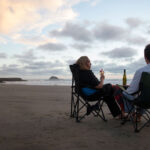It’s All Good – How the ethical banana came to New Zealand
Bringing any new product to market is challenging. Creating an entirely new category in perishable…
Bringing any new product to market is challenging. Creating an entirely new category in perishable fresh produce
and charging a premium is bananas.
by Andy Kenworthy.
All Good were the first to bring organically grown Fairtrade-certified bananas to New Zealand. Here’s how they did it.
Chris Morrison is the co-founder of Phoenix Organics, bought by Charlie’s for $10 million in 2005. Simon Coley had been developing and marketing new products at 42 Below, which Bacardi purchased in 2006 for $138 million.
Along with Chris’ brother Matthew, who was working as a bureaucrat in Treasury, in 2008 all three were looking for a new challenge.
Chris had seen how the Pacific’s banana trade had been devastated by globalisation, and how perfectly good organic bananas going to waste in Samoa. In a former life Simon had worked for Greenpeace and helped campaign to restore the banana trade between The Windward Isles and Britain. For many years the Windward Isles had remained politically and economically stable on the back of their banana industry.
There was a parallel with Samoa. Re-establishing a fair export market could ensure economic independence and security for banana famers.
Chris, Matt and Simon decided they would do for New Zealand’s bananas what the Fairtrade and organic movement was doing for coffee. They would recreate this partnership in the Pacific. Surely Kiwis would choose fresh fruit from our Pacific Island neighbours?
But fresh fruit coming into New Zealand must be sprayed for biosecurity. How could All Good get these bananas to market in tip-top organic condition? Would sealed climate-controlled shipping containers kill the bugs? Could they skip the spray? Unfortunately a large beetle flew out of All Good’s first container, straight onto the face of the inspector.
The spray ended any hope of organic certification; it also turned the Samoan bananas to mush. So All Good innovated. They dried and packed Samoan bananas before shipping them to New Zealand. They then recruited Amsterdam-based Fairtrade fruit distributor AgroFair to find fresh bananas from another source.
It was this partnership that led them to the El Guabo Association of Small Banana Farmers in Ecuador – a group of 150 small family farmers who had formed one of the world’s first Fairtrade farmer cooperatives.
But there was another problem. All Good wasn’t allowed to ship bananas from El Guabo to New Zealand. A competing banana firm had an exclusive deal with the shipping line.
“There were three government-approved source countries for bananas, explains Matthew. “We’d tried Samoa. The Philippines had no Fairtrade bananas. Now we couldn’t get them from Ecuador. We were stuck.”
After 18 months El Guabo threatened to boycott the shipping line unless they were allowed to ship bananas to New Zealand. The shipping line gave in. All Good ordered its first bananas and had ten days to get them from ship to shops to family fruit bowl before they went off.
It was time to get selling.
Chris had natural allies in specialist food shops, but All Good needed to get into the supermarkets, where bananas are one of the top three biggest selling items. It’s a gigantic industry supported by business relationships that can go back decades. Here was a small, start-up trying to break into a market dominated by big brands. People in New Zealand didn’t really know what Fairtrade bananas were. They said All Good were crazy; nobody would pay $1 more for a bunch of bananas.
“Those first six months were tough,” Matthew remembers. “We were selling bananas out of the back of my Mum’s car. Some produce managers would say ‘We’ll sell as many as you can fit in the car’. They just wanted to see how stupid I would be and how many boxes I would try to put in. But we were desperate. We filled the car up and went back and forth to the supermarkets from 4am until midday!”
Have faith
All Good had two things going for them. The unshakable faith that New Zealanders wanted an ethical banana, and good bananas.
“Our growers work with their families on their own few acres,” Matthew says. “They are obsessive about quality. They take a lot more care than some underpaid worker with health issues on a vast plantation. Our bananas taste better and look better.”
The produce managers laughed at Matthew’s collapsing car but were deadly serious about quality.
“Foodstuffs were good to us. They quickly saw the opportunity for customer choice, where there had been no differentiation.”
All Good didn’t have much of a marketing budget, but they had a story.
“When we started, hardly any customers knew where their bananas came from,” says Simon. “We introduced them to our growers and demonstrated how they were good for the land, good for the grower families and good for our customers’ families.”
They focused on social media and telling their story directly to consumers. They illustrated the good their customers were doing on the packaging, Point of Sale, and any other opportunity they could find.
Partnerships helped spread the message. All Good teamed with Kohu Road to make All Good banana ice cream. There were banana-flavoured Nice Blocks, donated bananas at athletic events and up to 1,000 cartons of bananas a year donated to community groups and events.
A pioneer in sustainability
Rachel Brown is CEO of the Sustainable Business Network (SBN), an organisation Chris Morrison has been part of since its inception in 2002, and All Good joined in 2012.
“All Good is a pioneer in sustainable, purpose-led business in New Zealand,” says Rachel. “It takes business smarts to make this work in such a tough segment – a special kind of guts as well.”
Over the years Simon, Chris and Matthew have all visited El Guabo, taking photographers, journalists and supporters along to spread the story.
In 2013 All Good hosted Wilson Sanchez from the El Guabo Cooperative. Wilson met the supermarket buyers and told them more about the importance of fair trade. The media followed his visit, and awareness of organic bananas was heightened further.
Even the All Good team was surprised at the support they generated. Groups like Tear Fund, Oxfam and Trade Aid got behind them. Prominent people volunteered to hand out free bananas.
In 2013 All Good made the World’s Most Ethical Companies list and a year later was crowned the World’s Fairest Trader by Fairtrade International.
“What surprised us was there was no set demographic,” says Matthew. “This isn’t some middle class latte-swilling thing. Anybody can understand the element of fairness and thinking about others.”
All Good has now sold more than 11 million bunches of bananas. It’s a victory for finding a niche and applying business smarts to a positive purpose.


